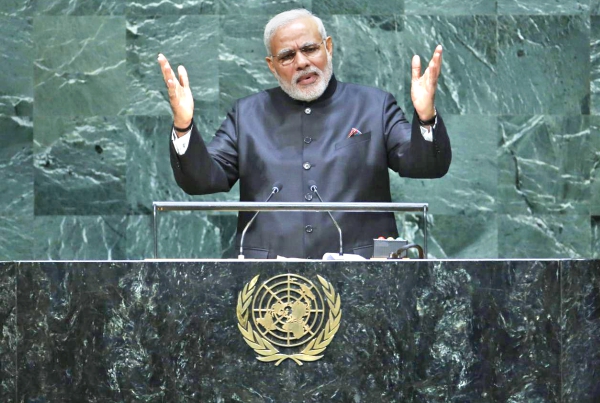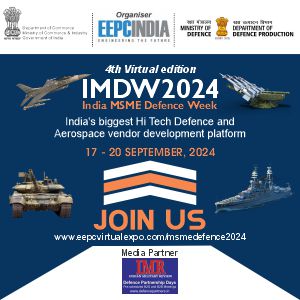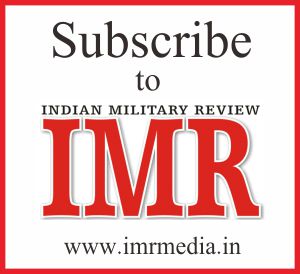Delhi’s uncontested election as Asia-Pacific candidate and concomitantly, winning 184/193 seats in the General Assembly marks a huge diplomatic success for India. It is forging ahead shattering its cliched image of a third world country to a “rising global power” or a “responsible stakeholder” in the global arena. India will aggressively utilize its election as a non-permanent member to set the momentum for the UNSC reforms as well as secure a permanent seat.
India’s Bid for the Permanent Seat on the Council
This is for the eighth time that India has been elected to serve on the Security Council. Previously, it was elected in 1950-1951, 1967-1968, 1972-1973, 1977-1978, 1984-1985, 1991-1992 and most recently in 2011-2012.
PM Modi has set the 5 “S” guidelines for India, namely, Samman (respect) Samvad (dialogue), Sahyog (cooperation), Samriddhi (prosperity) and Shanti (peace). Accordingly, India intends a multi-pronged approach to contribute towards adoption of innovative development programs, increased involvement of women and youth, an integrated response to terrorism, enhanced professionalism in UN Peacekeeping forces, and harnessing technological innovations for humanitarian challenges. Most importantly, Delhi will initiate a paradigm shift with the NORMS (New Orientation for a Reformed Multilateral System) theme for a “responsible’ and ‘inclusive’ United Nations. This includes a determined effort for the representation of the neglected states as well as to stake a claim to the Permanent seat at the UNSC.
ALSO READ: Pakistan’s Lies Nailed at the UN Security Council
For several decades, India has been a strong advocate of the reforms for the UN to adopt an inclusive and representative character towards strengthening international peace and security. New Delhi is determined to capture the permanent seat as it is the world’s largest democracy, second most populous country, an emerging economy and has been the largest contributor to the UN peacekeeping forces. Most importantly, India is realizing its role as a responsible stakeholder in the international forum. It has created a momentum along with its other G-4 members to bring about the change.
Possible Scenarios
• Delhi will proactively engage with G4, L69 and African Union states to establish the momentum to achieve long pending reforms in the UNSC, including securing a permanent seat in the UN SC.
• The opposing forces will also be active such as U of C (Union of Consensus) led by Italy/Pakistan to stall the addition of the Permanent Members to the Council or extension of the veto to the new powers.
• China will attempt to derail or delay the process and will exercise veto to stall India from gaining the permanent seat.
• India will harness soft power to design the momentum for gaining access to the UNSC as a permanent member.
• India will proactively engage the General Assembly members and UNSC members to counter-balance China so that the latter can ill-afford to use veto.
Roadblocks
There are several roadblocks to India achieving the Permanent seat at the UNSC. Hitherto, competing models with varied objectives have been proposed to reform the UNSC.
ALSO READ: INDIA – U.S.: Indo-US Defence Cooperation Enters New Phase
Delayed Progress: Since 2009, discussions are ongoing in the purview of an informal plenary at the Intergovernmental Negotiation (IGN) in the General Assembly. The discussions have not led to any substantial achievement, therefore, the G-4 countries are insisting to include a document for negotiations. In this regard, India’s Permanent Representative to the UN, Ambassador T.S. Tirumurti has reiterated that the progress of the IGN is “unsatisfactory” and India “will intensify engagement with all reform-minded states and groups” such as G-4 bloc, the Africa Group, L-69 group of developing countries, the African Union Committee of 10 (C-10).
Competing Models: The delay in reaching a proposal for amendment can mainly be attributed to the competing models of reforms proposed by different groups-G4, U of C, Africa Unions, ACT. Since 2005, G-4 consisting of India, Japan, Germany and Brazil are focused on attaining permanent membership of the UNSC as well as expansion of the non-permanent member category as well. They argue that the expansion is required in both categories. G-4 advocate veto powers for the permanent members, but in the given circumstances are open to delaying it for the period of 15 years. On the contrary, Uniting for Consensus (U of C) group (Italy, Pakistan, Canada) is proposing that any proposal for the reform of the UNSC should not be based on the two-thirds majority, rather there be a consensus among the members of the General Assembly.
The Power of Veto: There is a lack of agreement on whether new states should be given the power of veto. It is argued that the Veto power is granted to new members it will stall the process of action. As the ACT group has been trying to enforce that on the actions towards the genocide etc., there should be no veto. To accommodate this concern as well as overcome any opposition for the addition of new members, the G-4 Group are proposing to hold on to the veto power for the new members for 15 years.
Regional Rivalries: China is opposing the G-4 proposals as it has two of its rivals, Japan and India staking claim to the UN Security Council. China is further abetted by Pakistan, which is willing to stall India’s progress to the permanent seat in the Security Council. As a member of U of C, Pakistan is acting to stall India’s progress to the permanent seat.
Institutional Process: The reform of the Security Council entails an amendment to the UN Charter. It is a two-stage process, first, it requires the approval of the proposal by two-thirds majority in the General Assembly, that is 128 out of 193 states. (In this regard, the U of C groups is seeking consensus-based approval) Then, in the second stage, the amendment needs to be ratified by the two -thirds member states, including the five permanent Council members. It is crucial for all five members to ratify the amendment, or else, it lapses. Here, the use of veto can be crucial. China can use its power to veto to stall the process of amendment to halt the addition of India and Japan to the Security Council.
Thus, among the UN member states there is general agreement on the expansion of the membership of the council, but it is proving to be a contentious process. The lack of agreement is evident on issues of membership, veto, and representation. Regarding membership, whether there should be increase in the non-permanent members only or permanent members (PM) as well. Next, the question of Veto arises, should new PMs enjoy the privilege of veto or not. Relatedly, there are questions of regional representation and this has brought the regional rivalries to the surface. For instance, China and Pakistan are apprehensive of India’s candidature, Italy opposing Germany’s candidacy etc. Its emerging as a winner and losers’ situation-our gain or loss at what cost.

















